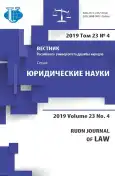ИНТЕГРАЦИЯ КАК ОБЪЕКТ ИССЛЕДОВАНИЯ ЮРИДИЧЕСКИХ НАУК
- Авторы: Рафалюк Е.Е.1
-
Учреждения:
- Секретариат Суда Евразийского экономического союза
- Выпуск: Том 23, № 4 (2019)
- Страницы: 490-509
- Раздел: ГОСУДАРСТВО И ПРАВО В СОВРЕМЕННОМ МИРЕ
- URL: https://journal-vniispk.ru/2313-2337/article/view/343674
- DOI: https://doi.org/10.22363/2313-2337-2019-23-4-490-509
- ID: 343674
Цитировать
Полный текст
Аннотация
Решение как теоретических, так и практических задач, связанных с правовым обеспечением интеграционных процессов, обусловливает актуальность поиска соответствующих методологических подходов для исследования указанной проблематики. Обращение к проблемам методологии изучения юридической природы и права интеграционных межгосударственных объединений имеет важное значение, так как до сих пор отсутствует единообразие в теоретической трактовке и методах исследования правового обеспечения интеграции. Целью данной статьи является рассмотрение возможностей применения междисциплинарного, полидисциплинарного, трансдисциплинарного (системного) подходов к изучению отдельных проблем, связанных с правовым обеспечением интеграции. В основу анализа избранной проблематики автором положены положения отечественных и зарубежных научных работ, посвященных проблемам методологии юриспруденции. В результате проведенного исследования автор статьи приходит к выводу о том, что в условиях глобального мира сложные объекты действительности, к которым относится также интеграция, не могут быть познаваемы в рамках одной научной дисциплины, что является значимым аргументом в пользу обращения к междисциплинарной, полидисциплинарной и системной методологии. При выборе соответствующего методологического подхода к исследованию интеграции следует учитывать: существо и характеристику изучаемого объекта; задачи конкретного исследования; цель исследования. Не менее важным аспектом в изучении интеграции является обращение к аксиологическим аспектам интеграционных процессов, а следовательно, изучение различных аспектов региональной экономической интеграции, например, культурологического, социологического, психологического, направленных на исследование ценностей и целей интеграции, состояния общества, роли человека в интеграционном процессе.
Об авторах
Елена Евгеньевна Рафалюк
Секретариат Суда Евразийского экономического союза
Автор, ответственный за переписку.
Email: rafaliuk_e@mail.ru
кандидат юридических наук, советник экспертноаналитического отдела Секретариата Суда Евразийского экономического союза
220006, Минск, Республика Беларусь, ул. Кирова, д. 5Список литературы
- Bottomore, T.B. (1983) Introducción en Interdisciplinariedad y Ciencias Humanas, trad. de J.G. Péres Martín. Madrid, Tecnos UNESCO. (in Spanish).
- Calvo García, M. (1994) Los fundamentos del método jurídico: una revisión crítica. Madrid. Editorial: Tecnos. (in Spanish).
- Díez Sastre, S. (2018) La formación de conceptos en el derecho public. Un estudio de metodología académica: definición, funciones y criterios de formación de los conceptos jurídicos. Madrid. Editorial: Marcial Pons, Ediciones Jurídicas y Sociales. (in Spanish).
- Decision of the judicial bench of the EAEU Court dated December 21, 2018, available at: http://courteurasian.org/page-25501; Decision of the judicial bench of the EAEU Court dated June 18, 2019 // http://courteurasian.org/page-26361 (Accessed 16 September 2019).
- Advisory opinion of the EAEU Court dated April 4, 2017, available at: http://courteurasian.org/page24731; Advisory opinion of the EAEU Court dated December 17, 2018, available at: http://courteurasian.org/page-25501; Advisory opinion of the EAEU Court dated June 18, 2019, available at: http://courteurasian.org/page-26361 (Accessed 16 September 2019).
- Falcón y Tella, Mª J. (2014) La justicia como mérito. Monografías Jurídicas. Ediciones Jurídicas y Sociales. Madrid. Editorial: Marcial Pons. (in Spanish).
- Grigorjan, K.G. (2012) Integrated approach to the assessment of the state and prospects of development of regional integration associations (on the example of the Association of Southeast Asian countries). Avtoref. dis. … kand. ekon. nauk [Abstract of PhD in economics]. Moscow: FGBOU VPO «Gosudarstvennyi universitet upravleniya» Publ. (in Russian).
- Ibánez Jiménez, J.W. (2011) Análisis económico del Derecho: método, investigación y práctica jurídica. Barcelona, Bosch: JMB. (in Spanish).
- Jiménez Piernas, C. (1995) El método del derecho internacional público: una aproximación sistémica y transdisciplinar. Editor: Universidad Carlos III de Madrid. Instituto de Estudios Internacionales y Europeos Francisco de Vitoria. Madrid, Tecnos. (in Spanish).
- Kerimov, D.A. (2003) Metodologiya prava. Predmet, funktsii, problemy filosofii prava [Methodology of law. Subject, functions, problems of philosophy of law]. Moscow: Modern humanitarian University Publ. (in Russian).
- Kimelev, Ju.A. (2011) Metodologiya sotsial'nykh nauk: (Sovremennye diskussii): Analiticheskii obzor [The Methodology of social Sciences (Contemporary debate): an Analytical review]. RAN. INION. Centr gumanit. scientific.-inform. research. depart. philosophy; ed. by Khlebnikov, G.V. Moscow: INION RAN Publ. (in Russian).
- Kutyeva, Je.R. (2005) Evraziistvo kak yavlenie kul'tury XX veka. Istoriografiya i metodologiya issledovaniya [Eurasianism as a phenomenon of culture of the XX century. Historiography and research methodology] Avtoref. dis. … kand. kul'turologii [Abstract of PhD in cultural studies]. Saint-Petersburg. Publishing house “LEMA” Publ. (in Russian).
- Larenz, K. (1994) Metodología de la ciencia del derecho. Barcelona, Ariel Derecho. Editorial: Editorial Ariel. (in Spanish).
- Malahov, V.P. (2018) Metodologicheskie i mirovozzrencheskie problemy sovremennoi yuridicheskoi teorii: monografija [Methodological and ideological problems of modern legal theory: monograph]. Malahov V.P., Jeriashvili N.D. (eds.). Moscow: JUNITI-DANA: Legislation and law Publ. (in Russian).
- Rodriguez Lozano, L.G., Zaragoza Huerta, J. (2012) La investigación del derecho y la ética. In: Metodología para investigaciones del alto impacto en las ciencias sociales. Madrid, Universidad Autónoma de Nueva León, Universidad Rey Juan Carlos. (in Spanish).
- Vallet de Goytisolo, J. (2004) Manuales de metodología jurídica. Madrid. Editorial: Fundación Cultural del Notariado. (in Spanish).
Дополнительные файлы









